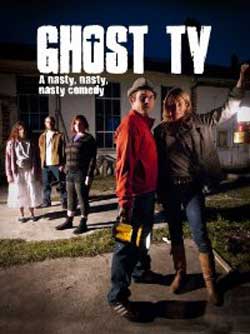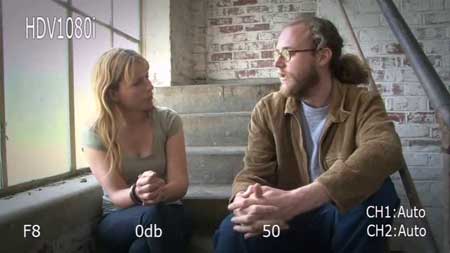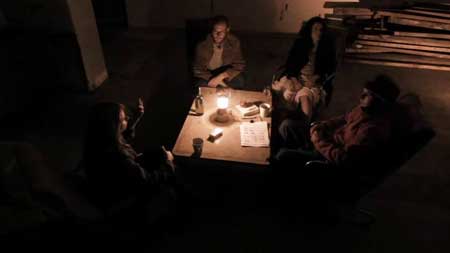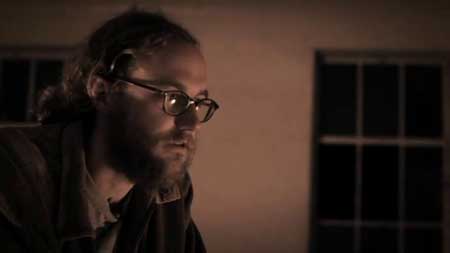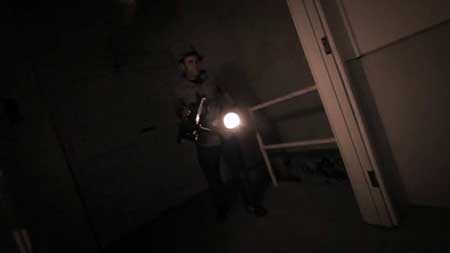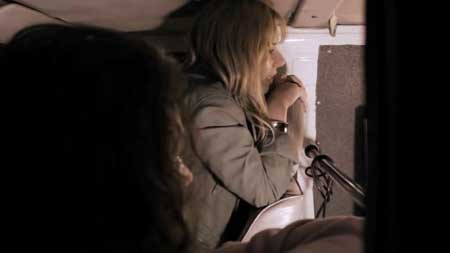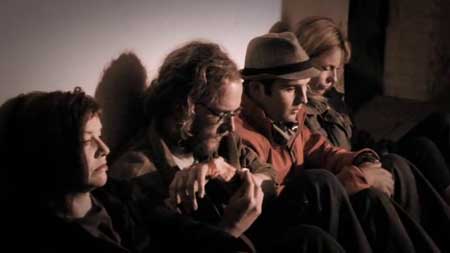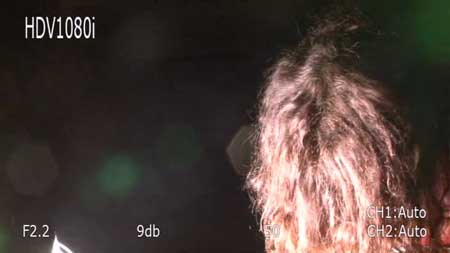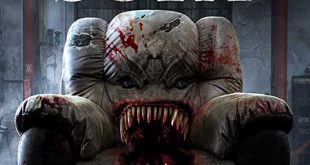SYNOPSIS:
A nasty, nasty comedy. A reality TV crew is making a programme, ‘Ghost TV’ about the haunted buildings that are the ruins of Seacliff Lunatic Asylum. As one might expect things do not go to plan. One of the crew is not very emotionally stable and when she discovers that she has been used callously by another crew member she snaps and runs off into the night, only to return with violent intent.
REVIEW:
One would have to be as unbiased as a toddler to not draw conclusions concerning “Ghost TV” based upon title and synopsis. Dollars to donuts, it must be another entry into the “Hey gang, let’s film supernatural stuff and immediately regret it!” found footage milieu. Since “Grave Encounters” (and its superior sequel) reached a point of sleeper success, the template has been milked by many in its wake. Not surprisingly, nearly all have left their viewers further appreciating The Vicious Brothers’ crafty creations.
If you passed similar prejudgment upon our latest offering, you’d be half correct. “Ghost TV,” the first output from writer/director Phil Davison since 2001’s “Kung Fu Vampire Killers” (a must-see for that moniker alone), follows the same path of a doomed paranormal investigation program, but does so without subjecting us to the mockumentary conceit. Though the combination of videotaped rough cuts and set shots can prove equally tiresome at times, it’s always appreciated when a character is allowed the common sense to put the damn camera down if two arms or an unobstructed view is called for.
Does this distinction make it worthwhile? Not especially. If anything, “Ghost TV” relies too heavily on the behind-the-scenes drama, propelling its threadbare plot with quirky performances and mildly engaging interpersonal relationships before stumbling into a woefully inept finale. An exceptional cast cannot suppress the feeling of just sitting around with them, waiting for a huge letdown to happen.
Davison certainly has chosen a fascinating true setting for his flawed opus. The Seacliff Lunatic Asylum in New Zealand, the country’s largest building upon its completion in 1884, was infamous for criminal neglect and experimental “behavioral modification” procedures throughout the decades. It was closed and condemned in 1974, much of the original structure demolished. Only a few of the outer buildings survive today, and the property remains the subject of local legend.
Enter “Ghost TV,” a struggling second-rate series facing cancellation if they fail to capture something more tangible than temperature changes and fruitless night vision patrols. Producer/director Wendy (Dell McLeod) refuses to fake evidence for ratings, so Seacliff is her last remaining hope. The show’s hosts and self-declared “eye candy,” Kate and Sam (Melissa Hobbs, Harley Neville), also face inescapable obscurity if they can’t deliver the goods. They are joined by college instructor Clayton, played as that aging hippie who bought you beer in high school by token American Adam Thompson. He requires paranormal evidence to fund his own studies through the university, and believes his withdrawn assistant Margie (Leah Caroll) may be the conduit that can help them to make contact.
Not only does the production play it smart by keeping the number of faces to remember at a bare minimum (Note to indie film makers: Not every third cousin needs a speaking role), it’s blessed with actors deserving of the screen time. The dialogue is clever without being cutesy, and you’ll find it hard to hate them even through the vast stretches of inactivity. There’s plenty of time for that once it all nosedives into the crapper.
A séance performed in the morgue results in the team’s first documented incident, as a glass jumps off the table into Margie’s lap. Disoriented, she is escorted by Kate to one of the rooms to rest. This leads to the endeavor’s only legitimate tension, an eerie (yet certainly not original) use of sound effects as the girls are surrounded by disparate shrieks and thumps within the confines of the small space. Of course, the sequence is undermined by the typical jump scare resolution when the door is finally flung open to reveal. . . well, not a ghost. Cat, wind gust, person, what does it really matter? It’s been done to death.
While searching for the hallway footage, Wendy accidentally plays a snippet of previously recorded dialogue with Clayton in which he confides that he is merely using Margie for her abilities as a spiritual attractant. She flees into the woods upon hearing this, and Kate volunteers herself and Sam to search for her. Once discovered and brought back to the premises, she promptly attacks Clayton and leaves a deep bite wound on his arm. They tie her up, but it only takes minutes for her to escape and proceed in stalking the others.
“Ghost TV” devolves into a low-rent slasher at this juncture, losing its senses of humor and individuality in the process. Despite a brief otherworldly encounter with unseen forces that reeks of afterthought, it’s never made clear if Margie’s is a case of possession or psychotic breakdown. This would be allowable if any of it was remotely frightening, but it’s nothing more than a succession of poorly choreographed confrontations sprinkled with a few instances of cheap gore. It’s senseless and awkward.
The poster art promises “a nasty, nasty, nasty comedy,” but Davison forgets that he’s a product of the same ilk as Peter Jackson, who scarred memories for life with “Dead Alive” and “Meet the Feebles.” Liberal use of profanity aside, this is tame by comparison to most R-Rated features. It makes me wonder how “Ghost TV” would’ve turned out had all hints of actual haunting and the unnecessary violence been abandoned, depicting just another uneventful outing on a television show bound for extinction. It could have been the “Seinfeld” of the genre! A horror movie about nothing!
It could work, friends. For starters, it would have to be much funnier. Then again, it still might not work.
 Horror News | HNN Official Site | Horror Movies,Trailers, Reviews
Horror News | HNN Official Site | Horror Movies,Trailers, Reviews
